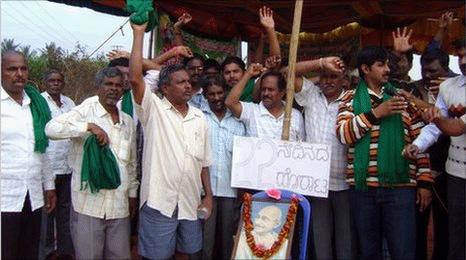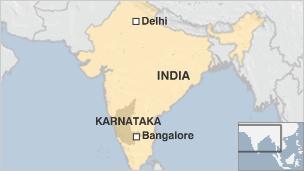Bangalore in the grip of a land scandal
- Published

These farmers are threatening to take their agitation to the street
It's the season of scams in India, says the country's media.
While the Indian government tries to deal with the anger over a huge telecoms scandal in the capital, Delhi, the authorities in Bangalore, in the southern state of Karnataka, are struggling to contain the fallout from an alleged massive land scam.
The state has ranked high on human development indexes for long and Bangalore - home to the world's biggest computer software firms - is known as the Silicon Valley of India.
But the state is now going through an identity crisis with many calling it the new Bihar - the northern state which was until recently one of the most corrupt and crime-infested regions of the country.
At the centre of the alleged land scam are thousands of acres of prime land acquired by the state over the years for development purposes, and the state's Chief Minister BS Yeddyurappa.
Under the scanner
Mr Yeddyurappa, who heads the only government of the Hindu nationalist Bharatiya Janata Party (BJP) in southern India, stands accused of allotting hundreds of acres of this land to family and friends.
In the Indian system, it's not unusual for the federal and state governments to allocate land at their discretion to "eminent personalities" from different fields.
But Mr Yeddyurappa is alleged to have taken his discretionary powers to a new level and allotted large chunks of land to his immediate family.
Mr Yeddyurappa denies all the accusations, but some of the mud seems to stick.
His opponents say over the years, rules have been rewritten to favour the few, fattening their bank balances beyond imagination.
No-one is able to say how much land or money is involved in the alleged scam.
"It's difficult to evaluate the monetary value, but it will be in billions of dollars," says Santosh Hegde, the state-appointed ombudsman who is investigating the case, told the BBC.
"It's the people in power, like the chief minister and his ministers, who are under the scanner," added the retired Supreme Court judge.
In his office in the capital city, Bangalore, I'm shown a copy of the complaint. It names the chief minister, his son and an MP, BY Raghavendra.
The complaint alleges that the land deals involved "favouritism, nepotism, corruption of various kinds".
Mr Yeddyurappa's two sons, son-in-law, daughter and daughter-in-law are all named as beneficiaries.
"Many of the lands are situated in fully developed areas and are of high commercial values… It suggests crores [tens of millions] of rupees changed hands," the complaint says.
In the last few years, land prices in Bangalore and other cities in the state have risen dramatically, says senior Congress party leader and legislator Krishna Byre Gowda.
"So land scams have become all pervasive. We have scams tumbling out of every major urban area of Karnataka," he says.
Just 10km (six miles) from Vidhan Souda - the grand state assembly building - is the Arkavathy Layout, an area that many say is at the centre of the allegedly corrupt deals.
In 2003, the Bangalore Development Authority issued a notification, acquiring more than 3,800 acres of land in the area from farmers.
Over the years, some parts of the land have been "denotified" and sold off in the market.
"In the last seven years, not an iota of development work has taken place," says farmer Shiv Kumar, who lost two acres of his family land.
'Greed over need'
I found Mr Kumar and a group of nearly 50 farmers protesting in Arkavathy Layout.
"Down with Yeddyurappa", "return the land to the farmer", they shouted.
"When the government acquired our land, they offered us a compensation of 1.3m rupees ($28,586; £18,384) per acre," he says.
"But the market value was 12.5m rupees. So we refused that small compensation."
Mr Kumar says almost 95% of the people in the area are farmers who depend on agriculture for living.
"This is our land, this is our property," he says. "They have no right to take over our land. What if we go to their homes and kick them out?
"Will they agree to that? They have come to our house and kicked us out. But we are not leaving."
The farmers have now set a deadline of 15 January for the government to sort out the issue.
"We are patiently waiting for them, but after 15 January, we will come out on the roads," Mr Kumar says. "We will hold a strike. We will take over our land forcibly and start ploughing again."
Ramakrishna Upadhya, a senior editor with the Deccan Herald newspaper, says governments can acquire land for setting up a special economic zone or an industry or developing infrastructure projects.
But, as Justice Hegde says, "greed often overtakes need", encouraging the kind of corruption being seen in Karnataka and many other parts of India.
With the spotlight on Karnataka for all the wrong reasons, the residents of Bangalore are unhappy.

"Karnataka doesn't deserve it. The state's population has so much potential," says Shashi Krishnamurthy.
"The whole thing, this land scam, sucks. It's very sad that the chief minister is not sacked immediately. Action was taken in the telecoms scam and minister A Raja was sacked. Same should happen here too."
Mr Raja was forced to step down last month after government auditors said he undersold mobile phone licences, causing the exchequer an estimated loss of almost $40bn.
But Mr Yeddyurappa, also accused of causing a massive loss to the state exchequer, has so far survived all attempts to dislodge him.
In October, he won two votes of confidence in controversial circumstances and has clung on to power despite criticism from the state governor and the federal government.
Congress president Sonia Gandhi recently asked all party chief ministers "to give up all discretionary powers, particularly in land allocation" since it was "breeding corruption".
And she dared the BJP to take action against Mr Yeddyurappa.
"The people of Karnataka have to bow their heads in shame," says Justice Hegde.
"A state which was once very well ruled and very disciplined, has now become the talk of the town for a lack of administration. It's a very sad state of affairs."
- Published30 December 2010
- Published14 October 2010
- Published6 October 2010